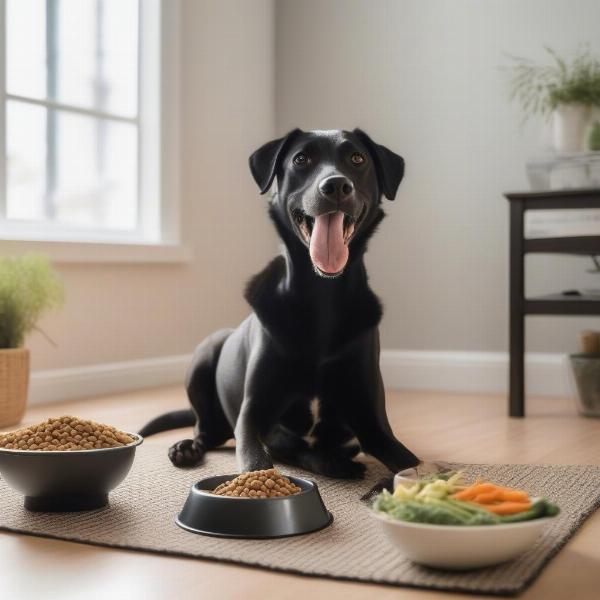Houston is known for its diverse culinary scene, but what about options for our furry friends? While “best hot dogs in Houston” might bring to mind delicious street food, this article focuses on providing valuable information about canine nutrition and debunks the myth that hot dogs are suitable for dogs. We’ll explore healthy alternatives and provide you with expert advice to ensure your dog enjoys a balanced and nutritious diet.
Why Hot Dogs Aren’t Healthy for Dogs
While the occasional small bite of plain, cooked hot dog might not cause immediate harm, regularly feeding your dog hot dogs can lead to several health issues. Hot dogs are typically high in sodium, fat, and processed ingredients, which can contribute to obesity, pancreatitis, and other digestive problems in dogs. The high sodium content can also lead to dehydration and exacerbate existing kidney or heart conditions. Furthermore, some hot dogs contain ingredients like onions and garlic, which are toxic to dogs.
 Dog Eating Healthy Food
Dog Eating Healthy Food
Healthy Alternatives to Hot Dogs for Dogs
Instead of hot dogs, opt for healthier treats and chews designed specifically for dogs. Look for options made with natural ingredients and avoid those with artificial colors, flavors, and preservatives.
- Dog-friendly fruits and vegetables: Offer small pieces of carrots, apples (without seeds), blueberries, or green beans as a healthy and low-calorie snack.
- Lean protein sources: Cooked chicken, turkey, or beef (without seasonings or bones) can be a great source of protein.
- Commercial dog treats: Choose high-quality treats with limited ingredients and avoid those with high sugar or fat content.
- Dental chews: These can help clean your dog’s teeth and satisfy their chewing instincts.
Creating a Balanced Diet for Your Canine Companion
Providing a balanced diet is crucial for your dog’s overall health and well-being. Consult with your veterinarian to determine the appropriate type and amount of food based on your dog’s breed, age, activity level, and any underlying health conditions. A balanced diet should consist of high-quality dog food, supplemented with healthy treats and fresh water.
Understanding Dog Food Labels
Reading dog food labels can be confusing, but it’s essential to ensure you’re choosing a nutritious option for your dog. Look for the Association of American Feed Control Officials (AAFCO) statement, which indicates that the food meets minimum nutritional requirements. Pay attention to the ingredient list, prioritizing whole meats and avoiding fillers and artificial ingredients.
“A balanced diet is the cornerstone of a healthy dog,” says Dr. Sarah Miller, DVM, a leading veterinary nutritionist. “Just like humans, dogs thrive on a diet rich in essential nutrients.”
Addressing Food Allergies and Sensitivities
Some dogs may have food allergies or sensitivities, which can manifest as skin issues, digestive problems, or other symptoms. If you suspect your dog has a food allergy, consult with your veterinarian. They may recommend an elimination diet to identify the culprit ingredient and suggest appropriate alternative foods.
The Importance of Fresh Water
Always ensure your dog has access to fresh, clean water. Dehydration can be serious and lead to various health problems. Provide multiple water bowls, especially in hot weather or if your dog is particularly active.
“Never underestimate the importance of fresh water,” adds Dr. Miller. “It’s vital for all bodily functions and helps maintain optimal health.”
Conclusion
While the phrase “best hot dogs in Houston” might tempt you to share your snack with your furry friend, remember that hot dogs are not suitable for regular canine consumption. Prioritize your dog’s health by providing a balanced diet, offering healthy alternatives to human food, and consulting with your veterinarian for personalized advice. By focusing on canine nutrition, you can help your dog live a long, healthy, and happy life.
FAQ
- Can dogs eat hot dog buns? While not toxic, hot dog buns offer little nutritional value and can contribute to weight gain.
- What should I do if my dog accidentally eats a hot dog? Monitor your dog for any signs of distress, such as vomiting or diarrhea. If symptoms persist, contact your veterinarian.
- Are there any human foods that are safe for dogs? Yes, some human foods, such as plain cooked chicken, carrots, and apples (without seeds), can be given to dogs in moderation.
- How often should I feed my dog? The frequency and amount of food depend on your dog’s age, breed, and activity level. Consult your veterinarian for guidance.
- How can I tell if my dog food is high-quality? Look for the AAFCO statement and prioritize whole meat ingredients. Avoid fillers, artificial colors, flavors, and preservatives.
- What are the signs of a food allergy in dogs? Common signs include itching, skin irritation, digestive problems, and ear infections.
- Why is fresh water so important for dogs? Water is essential for all bodily functions, including digestion, temperature regulation, and joint lubrication.
Related Articles
- dog friendly restaurants houston
- husky dogs for sale in houston
- indoor dog park houston
- dog boarding sugar land
ILM Dog is your trusted resource for expert advice on dog care, training, nutrition, and health. We offer a wide range of resources to help you provide the best possible care for your canine companion. From breed selection guidance to allen county dog warden ohio resources, we are dedicated to supporting dog owners worldwide. Contact us at [email protected] or +44 20-3965-8624 for personalized assistance.